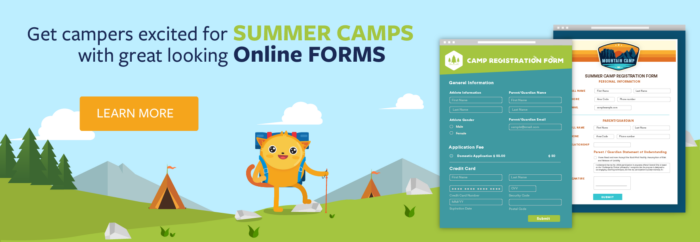Hiring a great staff is only a first step. You also need to train these staff members so that they’re set up for success.
There are a variety of ways to approach summer camp staff training. Whether it’s an early summer staff retreat, ongoing training over the course of the summer, or some combination of the two, choose a training regimen that works for you, your staff, and your campers.
Just so you know
Collect job applications, get employee feedback, track performance, and more with our free online summer camp forms!
Here are some ways to train your staff in an organized, effective fashion, regardless of the type of camp you’re running.
Pre-summer meeting. One useful approach is to gather your staff before the summer season starts and talk through all the activities they’ll be supervising. List activities on a whiteboard, and go over safety practices.
It’s equally important that your counselors understand how campers can benefit from each activity and from their camp experience in general. They also need to know how to lead in such a way as to maximize those benefits.
Ask your staff for their perspectives, add their ideas to the whiteboard, and discuss them. This will bring more great ideas to the table and make your staff feel like they actually influence the way the camp is being run. They will have more of a sense of ownership over the camp’s success.
Put community first. Camp may be about having new experiences and developing skills, but it should also be about making new friends, gaining confidence, working as a team, and feeling a sense of belonging. Counselors need to know that they can have a lifelong positive influence on their campers that goes beyond any athletic or recreational skills campers may gain.
Give your staff resources. Whether it’s a handbook, a helpful website, or a cheesy training video, you’ll want to give your staff members something to refer to over the course of the summer. They inevitably won’t remember everything from your pre-summer training session. So give them something that they can look back on whenever they have a problem. Creating a handbook personalized to your camp is a particularly good idea. You can build a book suited exactly to the activities you have planned and the schedule you have in mind.
Walk through possible scenarios. You never know what’s going to come up at camp. Sometimes serious events occur — like an injury or an instance of bullying. These are tough to even think about, but you and your staff must be prepared to deal with them. Walk through these scenarios with them and make sure they know exactly how they’re supposed to act. And, of course, walk them through the more mundane and less serious scenarios that can arise. You can never be too prepared.
Teach effective conflict management. Conflicts and disagreements are bound to arise. These could be conflicts between campers or even between staff members. Show counselors how to defuse these situations and foster harmony and compromise. Guide your staff in creating a safe environment for campers and their fellow staffers. Make it clear that you won’t tolerate bullying or harassment of any kind, and they shouldn’t either.
Plan a midsummer retreat. Your counselors have worked hard for a while; now it’s time for some fun. Break up the summer by planning a midsummer retreat halfway through the camp. This is the perfect opportunity for some staff bonding as you move into the second phase of the summer. Think of it as a reward for hard work and a quick break before finishing the summer strong.
Host weekly staff meetings. Any good workplace needs to check in periodically and make sure everyone is being heard. Weekly staff meetings are a perfect chance to reinforce training and go deeper into how to help campers have the best possible experience. You might ask counselors to report any successes and failures they’ve experienced over the past week and what they’ve learned. Encourage them to report any serious issues to their supervisor right away.
Evaluate regularly. Using online summer camp forms makes it easy to evaluate staff members and share that feedback seamlessly. No, you don’t want to make your counselors feel like they’re being judged at all times. But you do want to let them know what they’re doing well and what they could improve on. This keeps your team aware of where they stand at a performance level and gives them the tools to improve.
Evaluation and feedback through online forms
Make sure you’re training your staff correctly with online summer camp evaluation and feedback forms — free to create, customize, and use with Jotform!
Resources like the American Camp Association and state and regional camp associations offer more guidance on training. Wherever you start, the bottom line is that a well-trained staff makes for a smooth and rewarding summer camp experience for all.



































Send Comment: